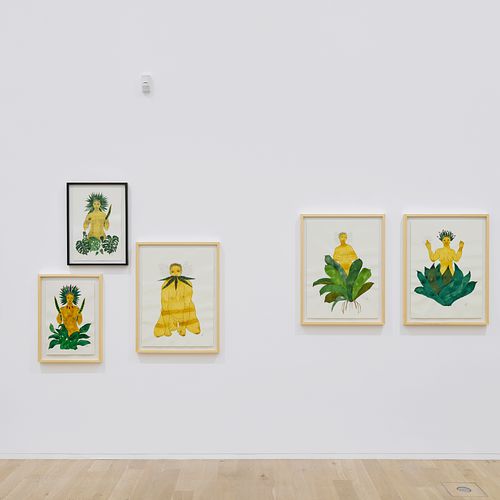AUDIO
Rosana Paulino
Throughout her work, the Afro-Brazilian artist Rosana Paulino explores spirituality, history, and self-empowerment. In the series Senhora das Plantas, she connects female bodies to Brazilian plants—many of which play a role in traditional healing practices or in the Candomblé religion.
She depicts these female figures naked, with frizzy hair, surrounded by bromeliads, snake plants, or jatobá trees. Many of them grow out of the plants, while others merge with them. The bodies appear powerful and open—not idealized, but rooted.
In the three works entitled Nascituras, the figures emerge from lush green leaves, carry plants on their heads, or have fine roots sprouting from their eyes and nipples. The title refers to unborn girls—also in a figurative sense: as a symbol of new ideas of identity and belonging.
Paulino also draws on religious associations in Espada de Iansã. In the Candomblé religion, the snake plant is associated with the deity Iansã, who represents wind, storms, and change. The figures depicted are simultaneously human, plant, and spiritual beings.
The figure in the piece Jatobá transforms herself into a tree. Roots grow from her legs, and small plants hang from her arms. In Brazil, the jatobá is a sacred tree, symbolizing strength, remembrance, and the connection to the earth.
Paulino’s images counter colonial and racist visual traditions with new narratives that depict Black women not as exotic figures, but as bearers of knowledge, history, and spiritual power.
She depicts these female figures naked, with frizzy hair, surrounded by bromeliads, snake plants, or jatobá trees. Many of them grow out of the plants, while others merge with them. The bodies appear powerful and open—not idealized, but rooted.
In the three works entitled Nascituras, the figures emerge from lush green leaves, carry plants on their heads, or have fine roots sprouting from their eyes and nipples. The title refers to unborn girls—also in a figurative sense: as a symbol of new ideas of identity and belonging.
Paulino also draws on religious associations in Espada de Iansã. In the Candomblé religion, the snake plant is associated with the deity Iansã, who represents wind, storms, and change. The figures depicted are simultaneously human, plant, and spiritual beings.
The figure in the piece Jatobá transforms herself into a tree. Roots grow from her legs, and small plants hang from her arms. In Brazil, the jatobá is a sacred tree, symbolizing strength, remembrance, and the connection to the earth.
Paulino’s images counter colonial and racist visual traditions with new narratives that depict Black women not as exotic figures, but as bearers of knowledge, history, and spiritual power.
